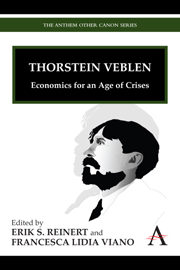Book contents
- Frontmatter
- Contents
- Acknowledgements
- List of Contributors
- 1 Introduction
- 2 Veblen's Contexts: Valdres, Norway and Europe; Filiations of Economics; and Economics for an Age of Crises
- Part One Norwegian Origins and Personal Life
- Part Two American Education
- Part Three Veblen's Politics
- Part Four Veblen's Economics
- 12 Thorstein Veblen: The Father of Evolutionary and Institutional Economics
- 13 Veblen's Words Weighed
- 14 The Great Crash of 2007 Viewed through the Perspective of Veblen's Theory of Business Enterprise, Keynes's Monetary Theory of Production and Minsky's Financial Instability Hypothesis
- 15 Predation from Veblen until Now: Remarks to the Veblen Sesquicentennial Conference
- 16 Capitalising Expectations: Veblen on Consumption, Crises and the Utility of Waste
- 17 Thorstein Veblen: Still Misunderstood, but More Important Now than Ever
- Name Index
- Subject Index
17 - Thorstein Veblen: Still Misunderstood, but More Important Now than Ever
from Part Four - Veblen's Economics
Published online by Cambridge University Press: 05 May 2013
- Frontmatter
- Contents
- Acknowledgements
- List of Contributors
- 1 Introduction
- 2 Veblen's Contexts: Valdres, Norway and Europe; Filiations of Economics; and Economics for an Age of Crises
- Part One Norwegian Origins and Personal Life
- Part Two American Education
- Part Three Veblen's Politics
- Part Four Veblen's Economics
- 12 Thorstein Veblen: The Father of Evolutionary and Institutional Economics
- 13 Veblen's Words Weighed
- 14 The Great Crash of 2007 Viewed through the Perspective of Veblen's Theory of Business Enterprise, Keynes's Monetary Theory of Production and Minsky's Financial Instability Hypothesis
- 15 Predation from Veblen until Now: Remarks to the Veblen Sesquicentennial Conference
- 16 Capitalising Expectations: Veblen on Consumption, Crises and the Utility of Waste
- 17 Thorstein Veblen: Still Misunderstood, but More Important Now than Ever
- Name Index
- Subject Index
Summary
More than a century has passed since the publication of Veblen's The Theory of the Leisure Class. And although the ideas he introduced in that book continue to be widely discussed today, they have never achieved the status that many feel they warrant. In this brief essay, I will attempt to explain why I think Veblen's ideas are so important and why they have not yet realised their full potential.
It is no accident that Veblen was moved to write about conspicuous consumption when he did. The Theory of the Leisure Class was published in 1899, near the end of the Gilded Age. In the United States, it was a time of almost unprecedented growth in inequality of income and wealth. People in every socio-economic group have always consumed in accordance with their income. When incomes are stagnant or rising at the same rate for all income groups, the consumption of the wealthy attracts little attention, because it doesn't stand out from the frame of reference that sets expectations. But because the incomes of top earners had been rising very rapidly during the 1890s, their consumption was particularly conspicuous, if only because no one had ever seen anything like it. Similar rapid growth of income and wealth among top earners today may help explain the current resurgence of interest in Veblen's ideas.
- Type
- Chapter
- Information
- Thorstein VeblenEconomics for an Age of Crises, pp. 353 - 360Publisher: Anthem PressPrint publication year: 2012
- 2
- Cited by



